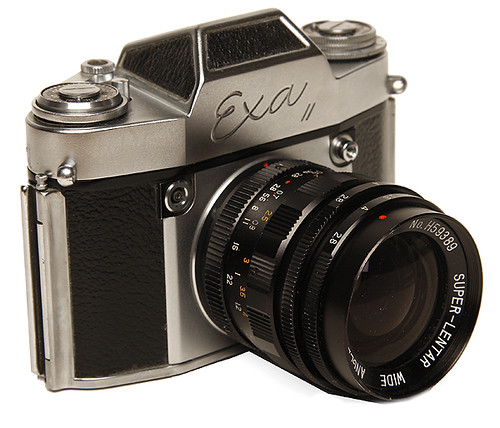Difference between revisions of "Exa II"
(added new top photo from CW pool; cats) |
m (Minor rewrite. Year-cat.) |
||
| Line 7: | Line 7: | ||
|image_rights= wp | |image_rights= wp | ||
}} | }} | ||
| − | The Exa II is a completely revised [[Exa]] model, introduced by [[Ihagee]] in 1959. It has a fixed [[pentaprism]] finder and cloth focal-plane shutter. It is quite well built, but has a few quirks: At the | + | The Exa II is a completely revised [[Exa]] model, introduced by [[Ihagee]] in 1959. It has a fixed [[pentaprism]] finder (the first Exa to have this<ref name=McK>{{McKeown12}} p424.</ref>) and a cloth focal-plane shutter, with speeds 1/2 - 1/250 second, plus 'B'. It has the standard Exacta bayonet lens mount. The camera is quite well built, but has a few quirks: the mirror does not return after exposure until the film is advanced, so the shutter curtain is susceptible to damage if the sun is focused on it in the meantime. At the back of the top housing there is a small lever which locks the shutter release button when in its right-hand position. |
| − | [[ | + | |
| + | ==Notes== | ||
| + | <references/> | ||
| + | |||
| + | [[Category:German 35mm SLR]] | ||
| + | [[Category:Ihagee|E]] | ||
| + | [[Category: 1959]] | ||
Revision as of 19:11, 20 May 2012

|
| Exa II fitted with preset wide-angle lens image by Rick Soloway (Image rights) |
The Exa II is a completely revised Exa model, introduced by Ihagee in 1959. It has a fixed pentaprism finder (the first Exa to have this[1]) and a cloth focal-plane shutter, with speeds 1/2 - 1/250 second, plus 'B'. It has the standard Exacta bayonet lens mount. The camera is quite well built, but has a few quirks: the mirror does not return after exposure until the film is advanced, so the shutter curtain is susceptible to damage if the sun is focused on it in the meantime. At the back of the top housing there is a small lever which locks the shutter release button when in its right-hand position.
Notes
- ↑ McKeown, James M. and Joan C. McKeown's Price Guide to Antique and Classic Cameras, 12th Edition, 2005-2006. USA, Centennial Photo Service, 2004. ISBN 0-931838-40-1 (hardcover). ISBN 0-931838-41-X (softcover). p424.